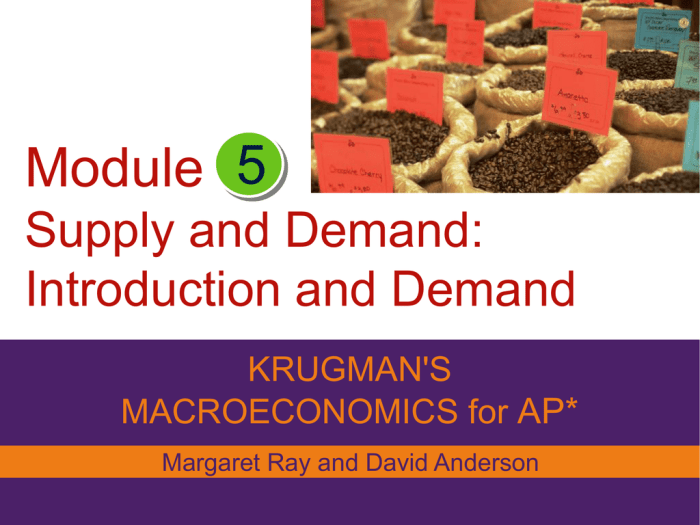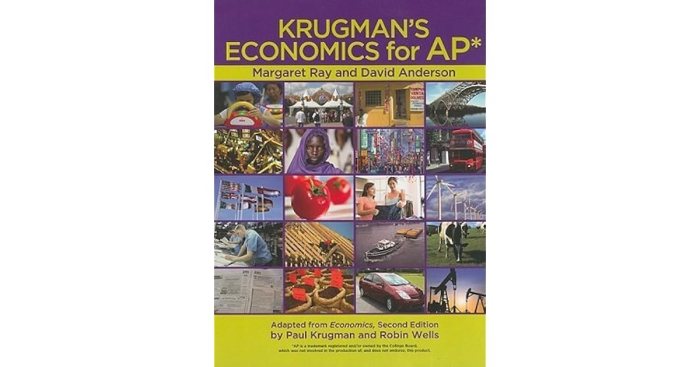Krugman’s economics for ap 4th edition – Krugman’s Economics for AP, 4th Edition, offers a comprehensive exploration of the fundamental principles of economics, as expounded by renowned Nobel laureate Paul Krugman. This highly acclaimed textbook provides an in-depth analysis of macroeconomic models, international trade and finance, economic growth and development, economic inequality, and the future of economics.
Krugman’s unique perspective and rigorous approach have shaped economic thought and policy worldwide. His theories and models have been instrumental in explaining complex economic phenomena, guiding policymakers, and fostering a deeper understanding of the global economy.
Krugman’s Economic Principles

Krugman’s economics emphasizes microeconomic foundations, international trade, and macroeconomic modeling. His principles have influenced economic thought and policy by highlighting the importance of incentives, trade, and government intervention.
Microeconomic Foundations
Krugman argues that microeconomics provides the foundation for understanding macroeconomic phenomena. He focuses on individual decision-making, market structures, and the role of information in economic outcomes.
International Trade
Krugman’s theory of comparative advantage explains how countries can benefit from trade, even if they are not the most efficient producers of all goods. His work has influenced trade policy and emphasized the importance of free trade.
Macroeconomic Models

Krugman’s macroeconomic models focus on the interaction between aggregate demand and supply. He emphasizes the role of expectations, fiscal policy, and monetary policy in stabilizing the economy.
Strengths of Krugman’s Models
- Provide insights into economic fluctuations and long-term growth.
- Incorporate microeconomic foundations to explain macroeconomic outcomes.
- Help policymakers design appropriate economic policies.
Weaknesses of Krugman’s Models, Krugman’s economics for ap 4th edition
- May oversimplify complex economic interactions.
- Can be difficult to calibrate and apply to specific economies.
- May not fully account for the role of financial markets.
International Trade and Finance
Krugman’s theories on international trade and finance emphasize the importance of trade barriers, exchange rates, and capital flows. He argues that trade deficits and surpluses are not necessarily harmful and that government intervention may be necessary to address trade imbalances.
Implications for Global Economic Policy
- Trade liberalization can promote economic growth.
- Exchange rate policies can affect trade flows and economic stability.
- Capital flows can lead to both benefits and risks.
Applications of Krugman’s Theories
- The North American Free Trade Agreement (NAFTA) was designed based on Krugman’s principles of comparative advantage.
- The European Central Bank uses Krugman’s models to set monetary policy.
Economic Growth and Development
Krugman argues that economic growth is driven by technological innovation, human capital, and government policies. He emphasizes the importance of education, infrastructure, and free trade in promoting economic development.
Role of Government Intervention
Krugman supports government intervention to promote economic growth, such as investing in education and infrastructure, providing subsidies for research and development, and regulating monopolies.
Challenges and Opportunities for Developing Economies
- Developing economies face challenges such as poverty, inequality, and political instability.
- They also have opportunities to leapfrog developed economies by adopting new technologies and investing in education.
Economic Inequality

Krugman’s research on economic inequality highlights the growing gap between the rich and the poor. He argues that inequality is caused by factors such as technological change, globalization, and government policies.
Causes of Economic Inequality
- Technological change has led to a decline in demand for low-skilled labor.
- Globalization has increased competition for jobs and wages.
- Government policies such as tax cuts for the wealthy have exacerbated inequality.
Consequences of Economic Inequality
- Inequality can lead to social unrest, political instability, and economic stagnation.
- It can also reduce social mobility and limit opportunities for the poor.
The Future of Economics: Krugman’s Economics For Ap 4th Edition

Krugman predicts that economics will become more interdisciplinary and focused on real-world problems. He emphasizes the need for economists to use data, models, and theory to address pressing economic challenges.
Challenges Facing Economics
- Climate change, technological disruption, and globalization pose significant challenges to the global economy.
- Economic inequality and social unrest are also pressing issues.
Opportunities for Economics
- Economics can provide insights into these challenges and help policymakers design effective solutions.
- New data sources and analytical techniques offer opportunities for advancing economic research.
Common Queries
What are the key economic principles explained by Krugman?
Krugman’s economic principles emphasize the role of incentives, market equilibrium, and government intervention in shaping economic outcomes.
How have Krugman’s macroeconomic models influenced economic policy?
Krugman’s macroeconomic models have been influential in guiding policymakers’ responses to economic crises, such as the 2008 financial crisis.
What are the implications of Krugman’s theories on international trade and finance for global economic policy?
Krugman’s theories on international trade and finance highlight the importance of free trade and the challenges posed by globalization.